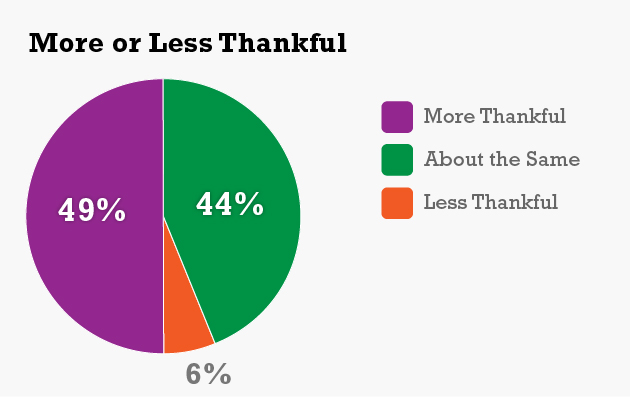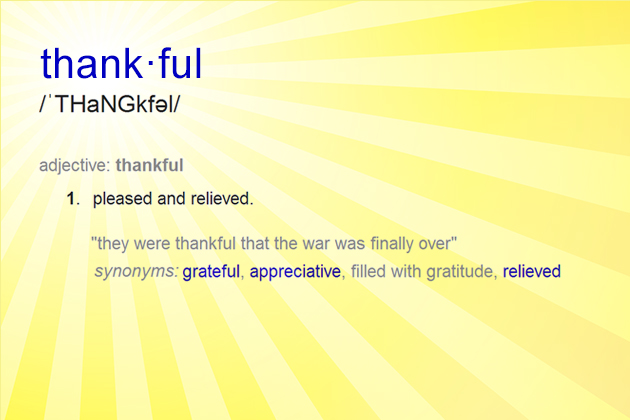
Source: The UConn Poll survey of 1,189 randomly selected adults, Nov. 16 through Nov. 21, 2013.
About half of American adults say they’re more thankful this Thanksgiving than they were in previous years, according to a new UConn Poll. Only 6 percent say they’re less thankful, while 44 percent say they feel about the same.
While that may seem like the national mood is on a fairly even footing, it’s a stark contrast to what Americans have said on previous holidays, according to data archived at the University of Connecticut’s Roper Center for Public Opinion Research.
The Roper Center, an incomparable storehouse of public opinion data stretching back to the 1930s, has the results of previous surveys showing that Americans are typically much likelier to feel an increased sense of thankfulness than they’re expressing in 2013.
An ABC News/Washington Post poll from 1981, for example, found that 72 percent were more thankful than they had been in 1980, while a Fox News/Opinion Dynamics poll from 1999 found 83 percent saying their holiday sense of thankfulness had grown.
A Harris survey from 1974, the year of President Nixon’s resignation and a gloomy time of skyrocketing gas prices and stock market doldrums, recorded just 38 percent of Americans feeling more thankful than they had been in 1973, but in general the archived data suggests that the 2013 figure of 49 percent is lower than usual.
“The poll doesn’t necessarily suggest widespread dissatisfaction, but it does indicate that a majority of Americans don’t feel that things have improved tremendously for them over the last few years,” says UConn Poll Director Jennifer Necci Dineen. “This could be a sign that people are still feeling the pinch of the worst economic downturn since the Great Depression.”
Dineen also highlighted some noteworthy differences among respondents in the UConn Poll: 43 percent of men are more thankful this year, for example, compared to 55 percent of women, while Democrats (53 percent) and Republicans (51 percent) were about the same; just 43 percent of unaffiliated voters feel more thankful, though.
The Northeast is the region least likely to feel more thankful this year, with just 37 percent of its residents feeling that way, compared to 56 percent of Southerners.
For many Americans, Thursday isn’t the only holiday this week. The Friday following Thanksgiving has become a kind of unofficial holiday, packed with holiday shopping, college football rivalry games, and other activities.
The UConn Poll found that watching football on TV the day after Thanksgiving is the most popular activity, with 20 percent of respondents saying that’s part of their Friday plan. The second most popular activity is relaxing or napping, cited by 15 percent, while holiday shopping and eating leftovers each got the vote of 14 percent of Americans.
The least popular activity, with just 1 percent of respondents citing it, is yard work, and 4 percent of Americans say they have to work on Friday.
Black Friday is typically seen as a crucial day in the calendar for retailers, but the poll suggests that’s becoming less true as online shopping gains in popularity. More Americans (36 percent) say they plan to shop on Cyber Monday, when online retailers offer big discounts, than on Black Friday itself (27 percent) or Thanksgiving (7 percent).
According to Paul Herrnson, executive director of the Roper Center for Public Opinion Research and professor of political science at UConn, “Once shoppers experience the online market place, they appear to like it.” He notes that in 1998, an NBC/Wall Street Journal poll showed that only 9 percent of Americans anticipated using online shopping services – a figure that doubled by 2012, before doubling again this shopping season.
These findings are based on The UConn Poll. The national sample of 1,189 randomly selected adults were interviewed by landline and cellular telephone between Nov. 16 and Nov. 21, 2013. The margin of sampling error for the survey is +/- 3 percentage points for the entire sample, and larger for subgroups.
The data have been weighted by the number of adults in a household and the number of telephone numbers, land and cellular, at which adults in the household can be reached in order to equalize the chances of an individual adult being selected. The data have also been weighted by the sex, race, and level of education of the respondent, based on the American Community Survey conducted by the U.S. Census.



